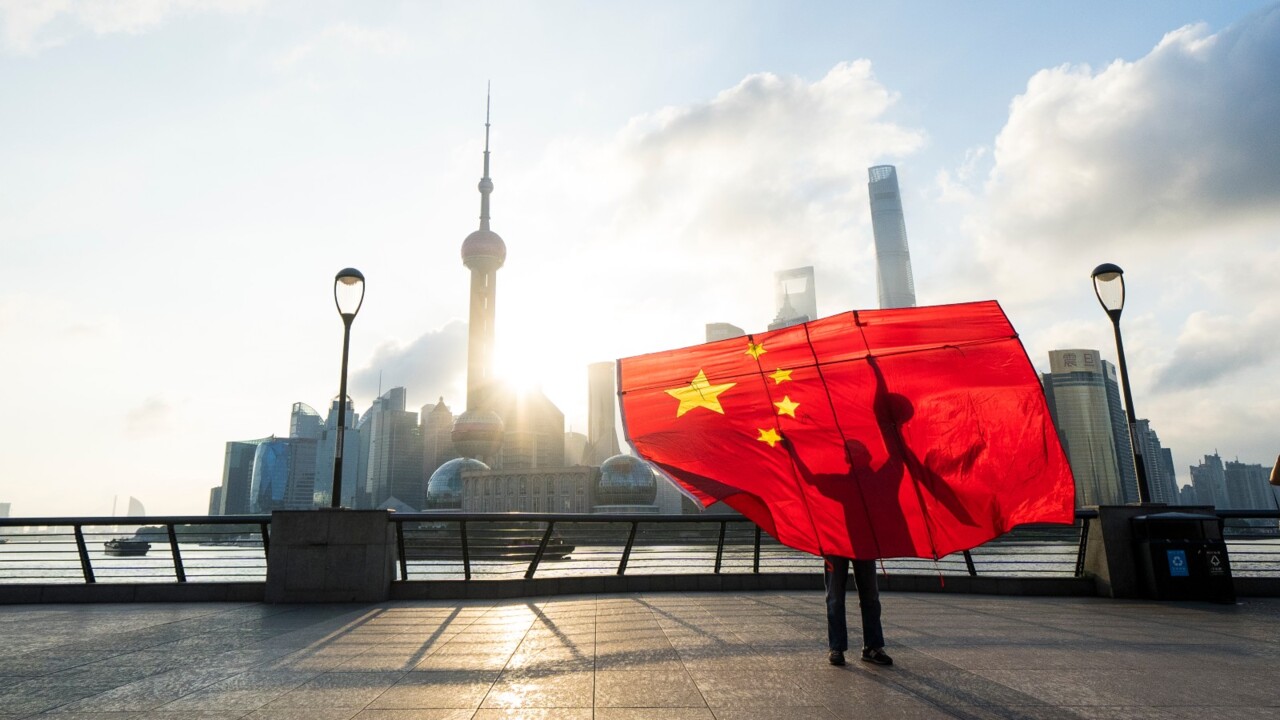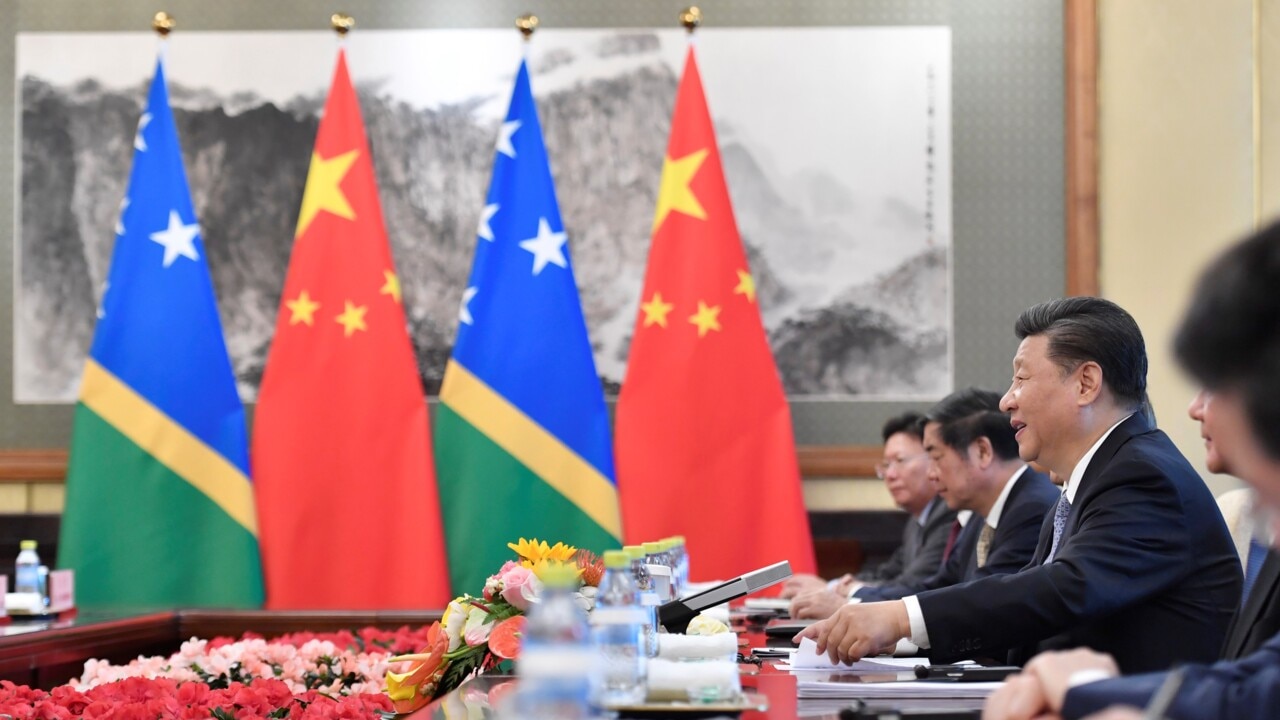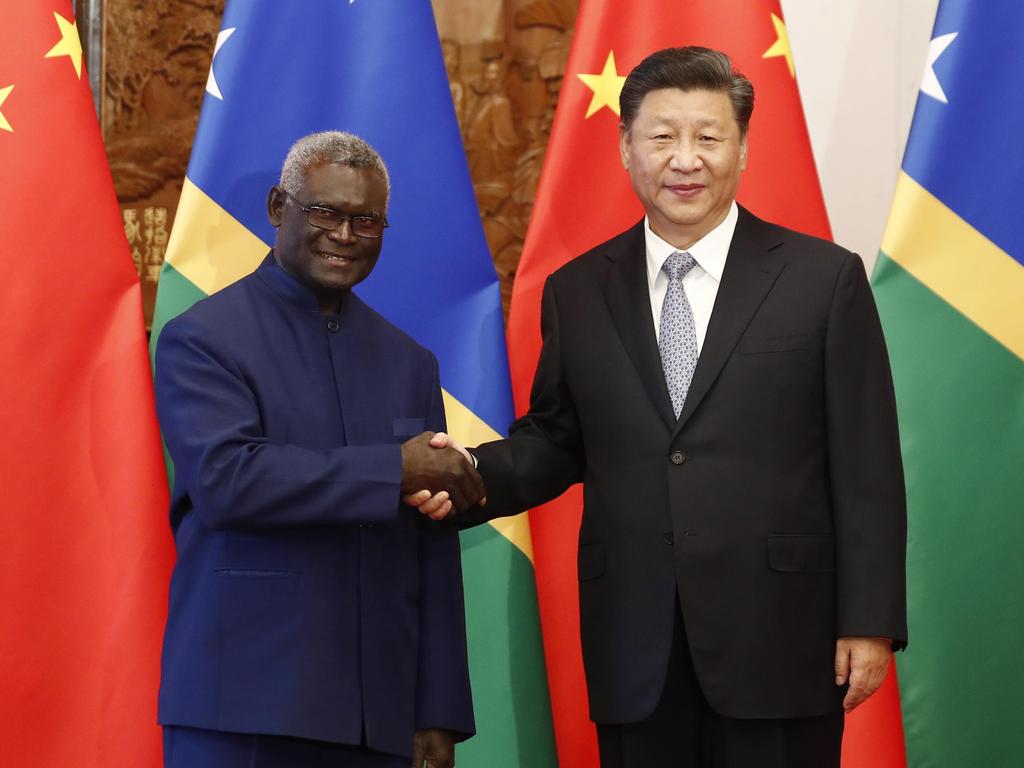China to fast-track troops push after Honiara deal
Australia and the US are bracing for the rapid deployment of Chinese security forces to the Solomon Islands, fearing Beijing will move to seal a controversial new security agreement.

Australia and the US are bracing for the rapid deployment of Chinese security forces to the Solomon Islands, fearing Beijing will move to seal a controversial new security agreement by putting “boots on the ground” as soon as possible.
Strategists said China would “move as fast as it can” to establish a foothold in the country, as the Solomon Islands opposition warned that the country’s Prime Minister, Manasseh Sogavare, would use the Chinese presence to tighten his hold on power.
China’s announcement on Tuesday night that it had signed the security pact with Honiara reverberated through the Australian election campaign, with Labor accusing the government of the “worst failure of Australian foreign policy in the Pacific” since WWII.
Scott Morrison said Mr Sogavare had faced “a lot of influence” from Beijing, and warned that Papua New Guinea, Fiji, Samoa and Tonga were under the same pressure to strike deals with China.
Mr Sogavare told his country‘s parliament on Wednesday that his government signed the agreement with its “eyes wide open”, to deal with “our own internal security situation”.
He said the final text of the deal would not be released without China’s permission.
An earlier leaked version said it would allow China to “make ship visits, carry out logistical replenishment in and have stopover and transition in the Solomon Islands”.

China experts and national security analysts warned that China would use the agreement to establish a strategic presence less than 2000km off Australia’s northeast coast.
The Lowy Institute’s senior fellow for East Asia, Richard McGregor, said Beijing would “move as fast as it can while they have a friendly leader in place in the Solomons to establish a physical foothold”.
“They would want to have boots on the ground and establish a concrete presence there – living quarters, possibly a small dock on the pretext of refuelling a supply ship,” Mr McGregor said.
“Once you have a presence there with the various leasehold arrangements, it’s pretty hard to make you leave. Once you have that, if the circumstances allow, you can expand it.”
Mr McGregor said China had moved “remarkably quickly” to bring Honiara under its influence since establishing diplomatic ties with the country in 2019.
He warned that, in the long-term, “China wants what the US has, which is a permanent military presence in the Pacific”.
Australian Strategic Policy Institute executive director Peter Jennings backed the assessment, declaring China would move quickly to “create facts on the ground”.
Writing in The Australian, Mr Jennings said: “Probably before our federal election is over, PLA cargo aircraft and ships will be arriving in Honiara with material to provide the ‘logistical replenishment’, ‘stopover and transition in Solomon Islands’ and to carry out the ‘major projects’ described in the leaked draft agreement.”

Mr Jennings said the agreement represented a serious policy failure for Australia.
“For decades we have over-estimated our influence in the Pacific; under-invested in promoting our security; and failed to appreciate China’s strategic intent,” Mr Jennings said.
“Australia’s defence policy, released in 2020, sets three fundamental goals: to shape Australia’s strategic environment; deter actions against our interests; and respond with credible military force, when required. We have failed in all three aims.”
Anthony Albanese said the government had failed to properly engage with Mr Sogavare on the agreement, despite being warned about it last year by Solomon Islands Opposition Leader Matthew Wale. “This is a massive foreign policy failure on the Prime Minister’s watch,” the Opposition Leader said.
He highlighted the Prime Minister’s decision to send the junior Minister for the Pacific, Zed Seselja, to try to talk Mr Sogavare out of the deal last week, rather than Foreign Minister Marise Payne, or Defence Minister Peter Dutton.
Former foreign minister Julie Bishop urged Senator Payne to “get on the next plane to the Solomon Islands” to discuss the “deeply disturbing” agreement.
Mr Morrison said he had spoken to Mr Sogavare on many occasions, but “you don’t go around stomping around telling leaders in Pacific Islands what they should and shouldn’t do”. He said there was “a lot of influence going on in the Pacific”, and Australia would work with regional counterparts to deal with challenges that arose.

“It is not a new issue and these threats still remain,” he said. “I speak to other Pacific leaders about it all the time.”
The signing of the security agreement – which Mr Sogavare said occurred “a few days ago” – came ahead of a high-level US visit to the Solomon Islands on Friday by two of Joe Biden’s top diplomats.
National Security Council Indo-Pacific co-ordinator Kurt Campbell and Assistant Secretary of State for East Asian and Pacific Affairs Daniel Kritenbrink had hoped to persuade the country to abandon the plan.
Addressing the Solomon Islands parliament on Wednesday, Mr Sogavare referred to recent rioting during which business and public buildings were torched.
“We will not allow any threats from within Solomon Islands to threaten regional stability,” he said.
Solomon Islands opposition MP Peter Kenilorea Jnr said it was expected that Mr Sogavare would use Chinese security forces to suppress community protests over his government’s performance, as he moved to extend his parliamentary term.
The Sogavare government has proposed putting off elections for a year to avoid a clash with the Pacific Games in November 2023.
E








To join the conversation, please log in. Don't have an account? Register
Join the conversation, you are commenting as Logout